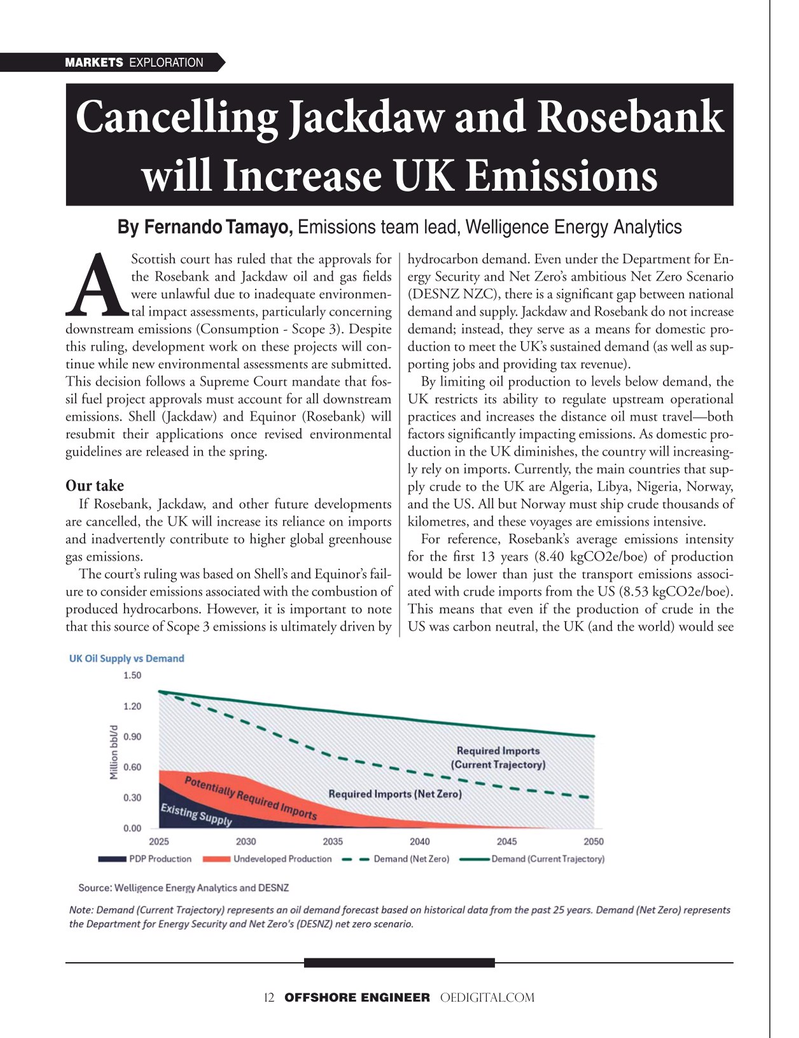
Page 12: of Offshore Engineer Magazine (Jan/Feb 2025)
Read this page in Pdf, Flash or Html5 edition of Jan/Feb 2025 Offshore Engineer Magazine
MARKETS EXPLORATION
Cancelling Jackdaw and Rosebank will Increase UK Emissions
By Fernando Tamayo, Emissions team lead, Welligence Energy Analytics
Scottish court has ruled that the approvals for hydrocarbon demand. Even under the Department for En- the Rosebank and Jackdaw oil and gas ?elds ergy Security and Net Zero’s ambitious Net Zero Scenario were unlawful due to inadequate environmen- (DESNZ NZC), there is a signi?cant gap between national
A tal impact assessments, particularly concerning demand and supply. Jackdaw and Rosebank do not increase downstream emissions (Consumption - Scope 3). Despite demand; instead, they serve as a means for domestic pro- this ruling, development work on these projects will con- duction to meet the UK’s sustained demand (as well as sup- tinue while new environmental assessments are submitted. porting jobs and providing tax revenue).
This decision follows a Supreme Court mandate that fos- By limiting oil production to levels below demand, the sil fuel project approvals must account for all downstream UK restricts its ability to regulate upstream operational emissions. Shell (Jackdaw) and Equinor (Rosebank) will practices and increases the distance oil must travel—both resubmit their applications once revised environmental factors signi?cantly impacting emissions. As domestic pro- guidelines are released in the spring. duction in the UK diminishes, the country will increasing- ly rely on imports. Currently, the main countries that sup-
Our take ply crude to the UK are Algeria, Libya, Nigeria, Norway,
If Rosebank, Jackdaw, and other future developments and the US. All but Norway must ship crude thousands of are cancelled, the UK will increase its reliance on imports kilometres, and these voyages are emissions intensive.
and inadvertently contribute to higher global greenhouse For reference, Rosebank’s average emissions intensity gas emissions. for the ?rst 13 years (8.40 kgCO2e/boe) of production
The court’s ruling was based on Shell’s and Equinor’s fail- would be lower than just the transport emissions associ- ure to consider emissions associated with the combustion of ated with crude imports from the US (8.53 kgCO2e/boe). produced hydrocarbons. However, it is important to note This means that even if the production of crude in the that this source of Scope 3 emissions is ultimately driven by US was carbon neutral, the UK (and the world) would see 12 OFFSHORE ENGINEER OEDIGITAL.COM

 11
11

 13
13